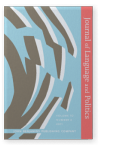Bleaching a dialectal voice in political discourse
Sociolinguistic choices in re-writing political speeches
In 1973, former President of Tunisia, Habib Bourguiba delivered nine speeches in which he recounted episodes of the national movement. Even though delivered in an official setting and to a highly educated audience, the semi-planned speeches were delivered in the dialectal variety of Arabic, i.e. Tunisian Arabic. The speeches were brought together in a book form titled ḥayātī, ’ārā’ī, jihadi (My Life, My Opinions, My Jihād). Their publication in a book form meant that the original performed texts were modified from a spoken mode to a written mode and ‘translated’ from Tunisian Arabic, a dialectal form of Arabic, to fuṣḥā, the High variety of Arabic (Ferguson 1959). The rewriting of the speeches led to strategic sociolinguistic choices. In the translation process, the linguistic product was regulated by a web of competing institutions of power, sites of linguistic ideologies, and linguistic practices; each of which represents an institution of power whose interests shift strategically between moments of ideological convergence and/or divergence, if not rivalry and connivance, among and between them. The present essay is an attempt to explore those sociolinguistic choices translated into erasures, shifts, modifications, and polishing of the original text. The carefully orchestrated changes in the original text, I believe, aim at re-establishing the authoritative presidential voice, restoring the institutional linguistic status quo, and rendering Bourguiba’s personal ‘ḥkāyāt’, stories, to ‘tārīkh aš-šaʿb t-tūnsi’, ‘the history of the Tunisian people’.
References (34)
Bakhtin, Mikhail
1986 Speech Genres and Other late Essays. Trans. Vern W. McGee. Ed. Caryl Emerson and Michael Holquist. University of Texas Press Slavic Series 8. Austin:University of Texas Press.
Bauman, Richard
1975 Verbal art as performance.
American Anthropologist 771, 290–311.
Bauman, Richard
1977 Verbal Art as Performance. Rowley, MA: Newbury House.

Bell, Alan
1984 Language style as audience design.
Language in Society131, 145–204.
Bessis, Sophie and Belhassen, Souhayr
1989 Bourguiba: Un si Long Règne (1957–1989) Paris: Jeune Afrique Presse.

Bourdieu, Pierre and Wacquant Loïc J
1992 An Invitation to Reflexive Sociology. Chicago: The University of Chicago Press.

Bourdieu, Pierre
1998 [1977] Outline of a Theory of Practice, tr. R. Nice. Cambridge: Cambridge University Press.

Bourdieu, Pierre
1991 Language and Symbolic Power. Cambridge, Massachusetts: Harvard University Press.

Bourdieu, Pierre
1990b Droit et passe-droit. Le champs des pouvoirs territoriaux et la mise en oeuvre des règlements.
Actes de la Recherche en Sciences Sociales 81/821, 86–96.
Bourdieu, Pierre
1989 La Noblesse d’Etat. Grands Corps et Grandes Ecoles. Paris: Editions de Minuit.

Bourguiba, Habib
1982 Ḥayāțī, ’ārā’ī, jihādī. Tunis: Ministry of Information Publications.

Briggs, Charles. L. and Bauman, Richard
1992 Genre, Intertextuality, and Social Power.
Journal of Linguistic Anthropology, 2(2), 131–172.


Ferguson, Charles A.
1959 Diglossia.
Word 151, 325–340.
El Guindi, Fadwa
1999 Veil: Modesty, Privacy and Resistance. Oxford/New York: Berg.

Errington, Joseph J.
2000 Indonesian(’s) Authority. In:
Bambi Shieffelin,
Kathryn Woolard, &
Paul Kroskrity (eds).
Language Ideologies: Practice and Theory. Oxford: Oxford University Press, 271–284.

Gal, Susan, and Irvine, Judith
2000 Language ideology and linguistic differentiation. In:
Regimes of language: Polities and Identities, Paul Kroskrity (ed). Santa Fe, NM: School of American Research Press, 35–83.

Gal, Susan
1998 Multiplicity and contention among language ideologies. In:
Bambi Shieffelin,
Kathryn Woolard, &
Paul Kroskrity (eds).
Language Ideologies: Practice and Theory. Oxford: Oxford University Press, 317–331.

Haviland, John. B.
2005 “Whorish old man” and “One (animal) gentleman”: The intertextual construction of enemies and selves.
Journal of Linguistic Anthropology 15 (1), 81–94.


Hill, Jane, H
2000 Read my article. In:
Paul V. Kroskrity (ed).
Regimes of Language: Ideologies, Polities, and Identities. Santa Fe Mexico: School of American Research Press, 259–291.

Haeri, Niloofar
2003 Sacred Language, Ordinary People. New York: Palgrave Macmillan


Haeri, Niloofar
2000 Form and ideology: Arabic Sociolinguistics and Beyond.
Annual Reviews Anthropology 291, 61–87.
Haeri, Niloofar
1997 The reproduction of symbolic capital: Language, state, and class in Egypt.
Current Anthropology 38(5), 795–816.


Hymes, Dell
1974 Ways of speaking. In:
Richard Bauman and
Joel Sherzer (eds).
Exploration in the Ethnography of Speaking. Cambridge: Cambridge University Press, 433–51

Malinowski, B.
1948 Myth in primitive psychology. In: Magic, Science and Religion. Glenco, Ill: Free Press.

Mertz, Elizabeth
1998 Linguistic Ideology and Praxis in U.S. Law School Classrooms. In:
Bambi B. Schieffelin,
Kathryn A. Woolard and
Paul V. Kroskrity (eds).
Language Ideologies: Practice and Theory. Oxford: Oxford University Press, 149–162.

Myers-Scotton, Carol
1993 Duelling Languages: Grammatical Structure in Codeswitching. Oxford: Clarendon.

Parkin, David
1984 Political language.
Annual Review of Anthropology (131), 345–365
Philips, Susan
2000 Constructing a Tongon Nation-State through Language Ideology in the Courtroom. In:
Kroskrity Paul (ed.).
Regimes of Language: Ideologies, Polities, and Identities. Santa Fe, New Mexico: School of American Research Press, 229–257.

Said, Edward
2000 Invention, Memory, and Place.
Critical Inquiry 26(2), 175–192.


Spitulnik, Debra
1998 Mediating Unity and Diversity: The Production of Language Ideologies in Zambian Broadcasting. In:
Schieffelin (eds.).
Language Ideologies: Practice and Theory, 163–188.

Spitulnik, Debra
1999 The language of the city: Town Bemba as urban hybridity.
Journal of Linguistic Anthropology 8(1), 30–59.


Woolard, Kathryn
1998 Introduction: Language Ideology as a field of inquiry. In:
Bambi B. Schieffelin,
Kathryn A. Woolard and
Paul V. Kroskrity (eds).
Language Ideologies: Practice and Theory. Oxford: Oxford University Press, 3–47

Cited by (2)
Cited by 2 other publications
Dunmire, Patricia L.
2012.
Political Discourse Analysis: Exploring the Language of Politics and the Politics of Language.
Language and Linguistics Compass 6:11
► pp. 735 ff.

This list is based on CrossRef data as of 5 july 2024. Please note that it may not be complete. Sources presented here have been supplied by the respective publishers.
Any errors therein should be reported to them.
